Related Research Articles
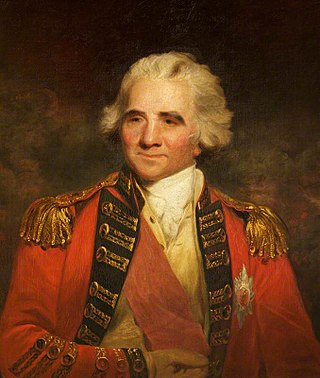
Lieutenant General Sir Ralph Abercromby was a British soldier and politician. He rose to the rank of lieutenant-general in the British Army, was appointed Governor of Trinidad, served as Commander-in-Chief, Ireland, and was noted for his services during the French Revolutionary Wars, ultimately in the Egyptian campaign. His strategies are ranked amongst the most daring and brilliant exploits of the British army.

Field Marshal Colin Campbell, 1st Baron Clyde,, was a British Army officer. After serving in the Peninsular War and the War of 1812, he commanded the 98th Regiment of Foot during the First Opium War and then commanded a brigade during the Second Anglo-Sikh War. He went on to command the Highland Brigade at the Battle of Alma and with his "thin red line of Highlanders" he repulsed the Russian attack on Balaclava during the Crimean War. At an early stage of the Indian Mutiny, he became Commander-in-Chief, India and, in that role, he relieved and then evacuated Lucknow and, after attacking and decisively defeating Tatya Tope at the Second Battle of Cawnpore, captured Lucknow again. Whilst still commander-in-chief he dealt with the "White Mutiny" among East India Company troops, and organised the army sent east in the Second Opium War.
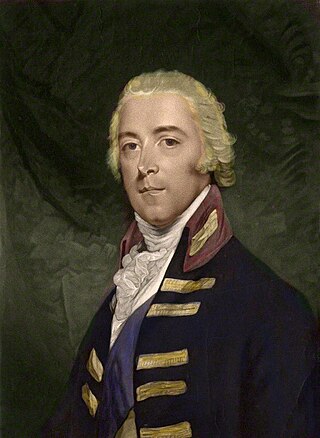
General John Pitt, 2nd Earl of Chatham, also 2nd Viscount Pitt and 2nd Baron Chatham, was a British soldier and politician. He spent a lengthy period in the cabinet but is best known for commanding the disastrous Walcheren Campaign of 1809.

Field Marshal John Colborne, 1st Baron Seaton, was a British Army officer and colonial governor. After taking part as a junior officer in the Anglo-Russian invasion of Holland, Sir Ralph Abercromby's expedition to Egypt and then the War of the Third Coalition, he served as military secretary to Sir John Moore at the Battle of Corunna. He then commanded the 2nd Battalion of the 66th Regiment of Foot and, later, the 52nd Regiment of Foot at many of the battles of the Peninsular War. At the Battle of Waterloo, Colborne on his own initiative brought the 52nd Regiment of Foot forward, took up a flanking position in relation to the French Imperial Guard and then, after firing repeated volleys into their flank, charged at the Guard so driving them back in disorder.
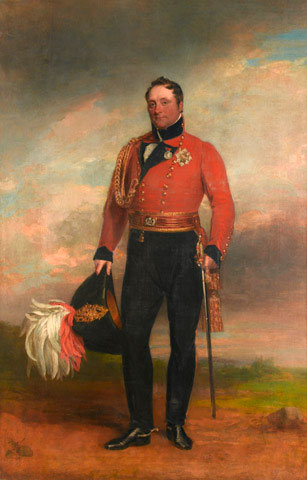
General Rowland Hill, 1st Viscount Hill, was a British Army officer and English aristocrat who served in the Napoleonic Wars as a brigade, division and corps commander. He became Commander-in-Chief of the British Army in 1828. Well-liked by the soldiers he commanded, he was known as "Daddy Hill".

General Sir James Kempt, was a British Army officer, who served in the Netherlands, Egypt, Italy, the Peninsula, and British North America during the Napoleonic Wars. He led a British brigade at the Battle of Waterloo and later became Governor General of Canada.

Field Marshal Sir William Maynard Gomm was a British Army officer. After taking part in the Anglo-Russian invasion of Holland, he served in most of the battles of the Napoleonic Wars. During the Hundred Days he took part in both the Battle of Quatre Bras and the Battle of Waterloo. He went on to be Commander of the troops in Jamaica and in that role established new barracks at Newcastle, Jamaica, high in the mountains. After that he became Governor of Mauritius and, finally, Commander-in-Chief, India, in which role he introduced promotion examinations for officers.

Lieutenant-General Sir William Stewart, GCB was a British military officer who was the first Commanding Officer of the Rifle Corps, a Division Commander in the Peninsular War and a Scottish Member of Parliament (MP) in the British Parliament.

The Walcheren Campaign was an unsuccessful British expedition to the Netherlands in 1809 intended to open another front in the Austrian Empire's struggle with France during the War of the Fifth Coalition. Sir John Pitt, 2nd Earl of Chatham, was the commander of the expedition, with the missions of capturing Flushing and Antwerp in the Netherlands and enabling navigation of the Scheldt River. Some 39,000 soldiers and 15,000 horses, together with field artillery and two siege trains, crossed the North Sea and landed at Walcheren on 30 July. This was the largest British expedition of that year, larger than the army serving in the Peninsular War in Portugal. Nevertheless, it failed to achieve any of its goals. The Walcheren Campaign involved little fighting, but heavy losses from the sickness popularly dubbed "Walcheren Fever". Although more than 4,000 British troops died during the expedition, only 106 died in combat; the survivors withdrew on 9 December.

General Sir Brent Spencer was an Anglo-Irish officer in the British Army, seeing active service during the American Revolutionary War and the French Revolutionary Wars. During the Peninsular War he became General Wellesley's second-in-command on two occasions. He fought at Vimeiro and testified in Wellesley's favour at the inquiry following the Convention of Cintra. He led a division at Bussaco and two divisions at Fuentes de Onoro. After the latter action, he had an independent command in northern Portugal. Wellesley, now Lord Wellington, was not satisfied that Spencer was up to the responsibilities of second-in-command and he was replaced by Thomas Graham. Miffed, Spencer left Portugal and never returned. He became a full general in 1825.
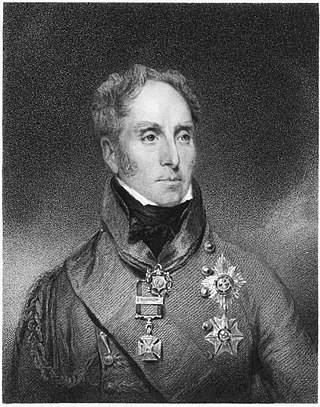
Lieutenant-General Sir James Leith was a Scottish soldier who served in the British Army, commanding the 5th Division in the Duke of Wellington's Anglo-Portuguese Army at several critical battles during the Peninsular War between 1810 and 1813.
General Sir William Houston, 1st BaronetKC was a British Army officer and Governor of Gibraltar. Houston joined the army in 1781, and by the start of the French Revolutionary War was a captain. He fought in the Flanders campaign before being promoted to major in 1794. As a lieutenant-colonel he fought at the Capture of Minorca and at the sieges of Alexandria and Cairo. Promoted to colonel in 1802, Houston fought in the Walcheren Expedition of 1809 before being promoted to major-general.
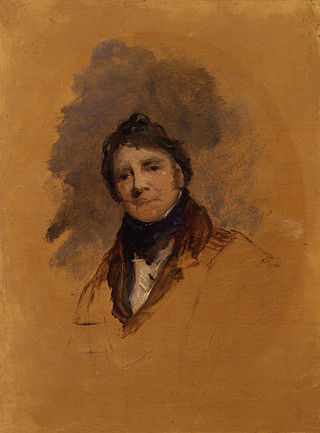
Field Marshal Thomas Grosvenor was a British Army officer. After serving as a junior officer defending the Bank of England during the Gordon Riots he took part in the Flanders Campaign including the retreat into Germany during the French Revolutionary Wars. He served as a brigade commander at the Battle of Copenhagen and was then deployed to Walcheren in the Netherlands where he served as deputy commander of a division led by Sir Eyre Coote during the disastrous Walcheren Campaign.
John Squire (1780–1812) was a British Army officer who rose to become a brevet lieutenant-colonel in the Corps of Royal Engineers during the Napoleonic Wars. Being a writer and diarist who kept journals of his travels, these and his supporting role in some of military campaigning's great moments – Egypt in 1801, South America in 1807, Sweden in 1808, the Netherlands at various stages and Spain in 1811–12 – have made Squire a moderately well-known figure among scholars who study the era.

Major-General Sir George Adam Wood CB K.St.V KCH KMT was a British Army officer who served in the Peninsular War and fought at the Battle of Waterloo on 18 June 1815.
General Gore Browne was a British Army officer who became Lieutenant-Governor of Plymouth.

General Sir James Archibald Hope, was a senior officer in the British Army.
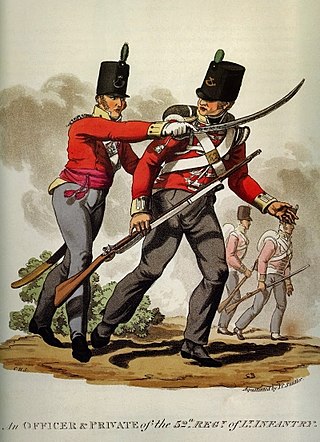
A battalion of detachments is a term used to refer to battalion-sized units of the British Army formed from personnel drawn from several parent units. They were used to temporarily collect together detached companies or individual stragglers into more manageable-sized formations for logistics purposes or to provide additional fighting forces. Two longer-term battalions were raised by Arthur Wellesley in 1809 for service in the Peninsular War. These comprised stragglers left behind following the British withdrawal at Corunna and saw action in the Oporto and Talavera campaigns before they were disbanded and the men returned to their regiments. Though effective on the battlefield criticism was made of their discipline in camp and on the march and there was concern over the impact on manpower in their parent regiments. Other battalions of detachments were later formed in the field from British and foreign units in the peninsula and during the Walcheren Campaign. Three units of British line infantry were formed from depots in England in 1814 but saw no action before the hostilities ceased after the Treaty of Paris. Similar units were employed as late as the 1857 Indian Mutiny.

Lieutenant-General Sir Robert Lawrence Dundas was a British Whig and military commander during the Peninsular War. He was a Member of Parliament in the House of Commons representing Malton from 1807 to 1812, East Retford from 1826 to 1827, and Richmond from 1828 to 1834 and from 1839 to 1841.
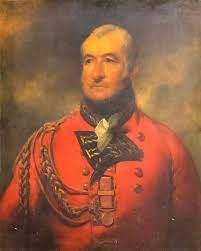
Lieutenant-General Robert Burne was a senior British Army officer who saw action in the Napoleonic Wars.
References
- ↑ The Publications of the Huguenot Society of London. Vol. 27–30. 1923. p. 186.
- 1 2 3 Blok, P.J.; Molhuysen, P.C. (1921). "Sontag, John". New Dutch biographical dictionary, Part 5.
- ↑ "'House of Lords Journal Volume 36: February 1780 11-20'". London: Journal of the House of Lords. Retrieved 1 October 2022.
- ↑ McGuigan, Ron; Burnham, Robert (2017). Wellington's Brigade Commanders. Barnsley, South Yorkshire: Pen & Sword Military. p. 272. ISBN 978-1-47385-079-8.